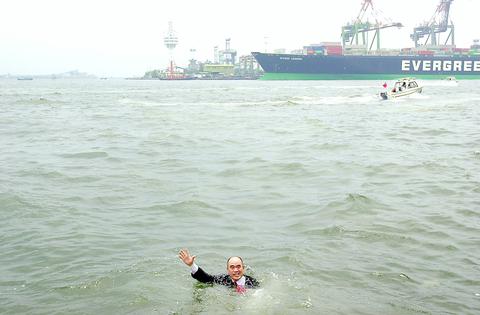President Chen Shui-bian (
"The relationship between central and local governments is one of partnership. It is not a competitive one or one in which one [government] dominates the other. The potential of Kaohsiung is greater than that of Taipei, so the prospects for the city's future will be immeasurable after the merger," Chen said during a boat trip, while leading a group of media executives to the city's harbor district.
Having taken a strong position on the merger, Kaohsiung Mayor Frank Hsieh (

PHOTO: CHANG CHUNG-YI, TAIPEI TIMES
"The establishment of an administrative board [to facilitate the transfer of managerial authority from the central government to Kaohsiung City] aims to address shipping companies' concerns, by making it clear that the harbor is not fully under the city government's control. The city government will improve the integration of city and harbor development plans," Hsieh said.
Although the Kaohsiung City Council is still opposed to certain details of the Cabinet's merger plan, Hsieh said that he would continue to press the legislature for a "much more complete" merger.
In accordance with the Ministry of Transportation and Communications' plan, administrative boards will soon be set up in all four of Taiwan's international harbors.
Nine to 13 board members, recommended by local governments and approved by the ministry, will be appointed to run each board, headed by local mayors and in Hualien's case, a county commissioner.
The four international harbors in Taiwan are Kaohsiung, Keelung, Taichung and Hualien Harbors.
Upon Chen's arrival at the harbor, Kaohsiung City Councilor Chen Tsun-hsiung (
"It's the passing of a milestone for Kaohsiung. I fully support it," Chen said as he stood in the water, treading water excitedly to indicate his satisfaction with the news.
Expressing his excitement, President Chen also said that he felt "closer to the southern sea after setting foot in the harbor," and that it helped him to reflect more easily on the meaning of Taiwan being an "ocean country."
President Chen, in addition, urged Kaohsiung Harbor to maintain its competitiveness with other international harbors in the world, adding that the central government should work hand in hand with local governments to create a "win-win" situation.
Commenting on the differences between northern and southern cities, President Chen also said that "inappropriate government policies" had led to the rising unemployment rate, lack of medical and other resources, and underdevelopment in the south.
Consequently, he said, he has ordered certain important gatherings, such as state banquets, be held in central and southern Taiwan.
Recalling his past experiences as a maritime lawyer, President Chen added yesterday that he was delighted to meet former clients in Kaohsiung, including the head of the Kaohsiung Harbor Bureau who briefed yesterday's meeting.

ENDEAVOR MANTA: The ship is programmed to automatically return to its designated home port and would self-destruct if seized by another party The Endeavor Manta, Taiwan’s first military-specification uncrewed surface vehicle (USV) tailor-made to operate in the Taiwan Strait in a bid to bolster the nation’s asymmetric combat capabilities made its first appearance at Kaohsiung’s Singda Harbor yesterday. Taking inspiration from Ukraine’s navy, which is using USVs to force Russia’s Black Sea fleet to take shelter within its own ports, CSBC Taiwan (台灣國際造船) established a research and development unit on USVs last year, CSBC chairman Huang Cheng-hung (黃正弘) said. With the exception of the satellite guidance system and the outboard motors — which were purchased from foreign companies that were not affiliated with Chinese-funded

PERMIT REVOKED: The influencer at a news conference said the National Immigration Agency was infringing on human rights and persecuting Chinese spouses Chinese influencer “Yaya in Taiwan” (亞亞在台灣) yesterday evening voluntarily left Taiwan, despite saying yesterday morning that she had “no intention” of leaving after her residence permit was revoked over her comments on Taiwan being “unified” with China by military force. The Ministry of the Interior yesterday had said that it could forcibly deport the influencer at midnight, but was considering taking a more flexible approach and beginning procedures this morning. The influencer, whose given name is Liu Zhenya (劉振亞), departed on a 8:45pm flight from Taipei International Airport (Songshan airport) to Fuzhou, China. Liu held a news conference at the airport at 7pm,

Taiwan was ranked the fourth-safest country in the world with a score of 82.9, trailing only Andorra, the United Arab Emirates and Qatar in Numbeo’s Safety Index by Country report. Taiwan’s score improved by 0.1 points compared with last year’s mid-year report, which had Taiwan fourth with a score of 82.8. However, both scores were lower than in last year’s first review, when Taiwan scored 83.3, and are a long way from when Taiwan was named the second-safest country in the world in 2021, scoring 84.8. Taiwan ranked higher than Singapore in ninth with a score of 77.4 and Japan in 10th with

GRIDLOCK: The National Fire Agency’s Special Search and Rescue team is on standby to travel to the countries to help out with the rescue effort A powerful earthquake rocked Myanmar and neighboring Thailand yesterday, killing at least three people in Bangkok and burying dozens when a high-rise building under construction collapsed. Footage shared on social media from Myanmar’s second-largest city showed widespread destruction, raising fears that many were trapped under the rubble or killed. The magnitude 7.7 earthquake, with an epicenter near Mandalay in Myanmar, struck at midday and was followed by a strong magnitude 6.4 aftershock. The extent of death, injury and destruction — especially in Myanmar, which is embroiled in a civil war and where information is tightly controlled at the best of times —